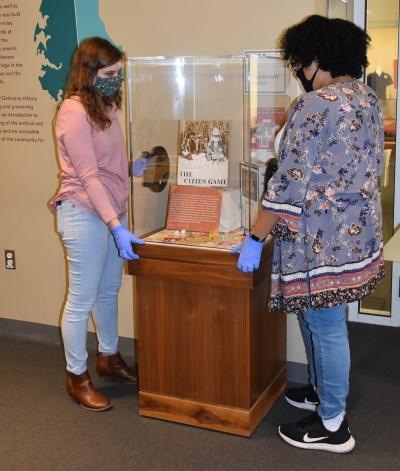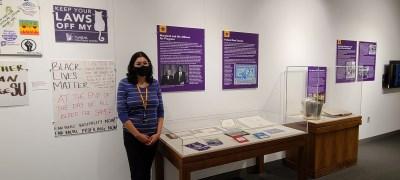
Nabb Center Students and Interns Help Curate Voices and Votes Exhibit
 In May 2020, the Edward H. Nabb Research Center was fortunate to be one of five organizations in the state selected by Maryland Humanities to host the Smithsonian Museum on Main Street traveling exhibition, Voices and Votes: Democracy in America. The exhibit, which was on display in the lobby of the Guerrieri Academic Commons August 14-October 4, 2021, is based on a major exhibition currently on display at the Smithsonian’s National Museum of American History.
In May 2020, the Edward H. Nabb Research Center was fortunate to be one of five organizations in the state selected by Maryland Humanities to host the Smithsonian Museum on Main Street traveling exhibition, Voices and Votes: Democracy in America. The exhibit, which was on display in the lobby of the Guerrieri Academic Commons August 14-October 4, 2021, is based on a major exhibition currently on display at the Smithsonian’s National Museum of American History.
Being chosen to host Voices and Votes provided the Nabb Center with an excellent opportunity to dive into its collections in search of stories that exemplified the themes of the exhibit on a local level. Over the past year, Nabb Center students and interns assisted in the quest to find historical documents, images and artifacts in the collection that would bring to life stories of the people and events that helped shaped democracy on Delmarva. The results of this treasure hunt form the companion exhibit Voices and Votes: Democracy on Delmarva.
In the lead-up to the exhibit, student curatorial assistant Sabrina Tarver, graduate assistant Marianna Agazio and museum studies intern Samantha Steltzer took on the monumental task of documenting the Nutters Election House collection. This significant political collection contains over 2,500 objects and archival items from national, state and local political campaigns spanning from 1820-2001. Included are hundreds of campaign posters and buttons, ballots, voter registration ledgers, and many campaign novelties. The students researched, cataloged and photographed objects in the collection and entered the data into our PastPerfect collections database. Throughout the process, they identified objects for possible inclusion in the exhibit.
As part of a field study for the University of Maryland College Park Master of Library and Information Science (M.L.I.S.) program, graduate student Nicole Kulp processed and completed a finding aid for the archival portion of the Nutters collection. Kulp also researched and wrote text for a section of the exhibit on the history and use of songs in political campaigns.
Tarver sifted through countless boxes of records in the Wicomico Woman’s Club collection and was fascinated by their campaign to make milk safer for Salisbury residents in the 1920s. She researched bovine tuberculosis and dairy practices during that time and found a hooded dairy pail in the Nabb collection to perfectly illustrate this story. Tarver’s work paid off: she now has a job as the archives administrator and librarian at the Lovely Lane Museum and Archives in Baltimore.
Rihanna Stevenson, Nabb Center’s Digital Humanities intern and student assistant, conducted in-depth research on whether an event similar to the Boston Tea Party occurred in Chestertown, MD. She also transcribed and researched a 1795 letter in the collection that provides a glimpse into the emergence of our nation’s two-party political system.
 A curious collection of diplomatic gifts from Brazil led student assistant Sandra Zelaya down the path to discover Maryland’s connection to Rio de Janeiro and the late Governor Tawes’ role in President John F. Kennedy’s Alliance for Progress – a U.S. effort intended to promote democracy and provide aid to Latin American nations. Zelaya also researched and wrote text on the Civil Rights Movement on the Eastern Shore of Maryland and created a short film using historic images and audio recorded in 1963 on the streets of Cambridge, MD. She is currently completing work on an online research guide to the Nabb Center’s political and civic collections.
A curious collection of diplomatic gifts from Brazil led student assistant Sandra Zelaya down the path to discover Maryland’s connection to Rio de Janeiro and the late Governor Tawes’ role in President John F. Kennedy’s Alliance for Progress – a U.S. effort intended to promote democracy and provide aid to Latin American nations. Zelaya also researched and wrote text on the Civil Rights Movement on the Eastern Shore of Maryland and created a short film using historic images and audio recorded in 1963 on the streets of Cambridge, MD. She is currently completing work on an online research guide to the Nabb Center’s political and civic collections.
The Nabb Center provides an opportunity for students and interns to gain hands-on experience working with archival and artifact collections and to conduct historical and material culture research. Their work is instrumental in documenting, digitizing, and making accessible the collections held by the Center and plays a key role in the development of exhibitions.
The physical exhibit closed in early December, but you may explore the stories curated by Salisbury University students in Voices and Votes: Democracy on Delmarva by visiting the exhibit online.